NATIVE ROOTS: AFRO ROCK TIMELINE
The first generation of Nigerian rock and roll converts
The first generation of Nigerian rock and roll converts
The Nigerian Broadcasting Service is established from the British Owned Radio Diffusion Service, creating radio stations in Kaduna, Ibadan, Lagos, Enugu and Kano. The creation of radio stations would take the monopoly of radio broadcasting from British propagandists and introduce radio for entertainment purposes to Nigerian audiences.
This shift creates a demand for entertainment between news broadcasts and introduces teenage audiences of the era to the music popular in Great Britain and the Americas. American Jazz and Rock and Roll were crossing the pond at this time, driven by Hollywood and musicians like Chuck Berry. As Nigerian broadcasting looked to Britain and Britain looked to America, the trickle effect created the first generation of Nigerian rock and roll converts.
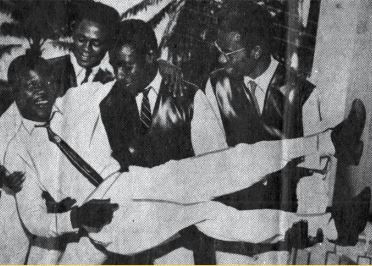
After two years of performing as an informal troupe, the Hykkers earn a gig performing weekly on the television programme Saturday Square, targeted at a youth audience fed on a diet of American Rock ‘n’ Roll and British Funk, the Hykkers sound fed the new aspirations for a western lifestyle and positioned them as teen pop idols.
It takes two years and a pivot to traditional media for the Hykkers and by extension Afro-funk to get a foot indoor because of the overwhelming influence of Highlife music at the time.

Hykkers meet Fela Anikulapo-Kuti and the Koola Lobitos band, who are the default band for Jamaican pop star Jimmie Small as he tours the country. This is the Hykkers first major gig apart from television and the contact with Fela introduces a brass section to the band’s sound, changing its composition and making Afro-Funk more accessible to Nigerian audiences.

Fractions gain prominence after opening for American rock and roll singer Chubby Checker. Checker was at the height of his fame in 67, and just coming off a tour across Europe. It had become customary for African American singers to make pilgrimages to the ‘motherland’ and perform sets in its burgeoning nightlife scene. Checker provided the Fractions with the momentum needed to introduce their gritter Motown influenced sound to Lagos’s audiences and spark a revolution.
Their fame in Lagos was short-lived, by the middle of their breakthrough year, a civil war would end their Lagos domination and see them repatriated to the East.
The Nigerian Civil War brings to a head a year of political strife and forced allegiances. General Ojukwu makes a call for all Nigerians of Eastern descent to return to their home region and support the cause of Biafra. In response, the Nigerian government forces Nigerians of Eastern origin to leave the major cities, Lagos included.
Musicians like Jake Sollo, Rex Lawson and groups like The Hykkers and The Fractions all move to the east and take up residencies in renowned hotels like the Dolphin Cafe Hotel and the Plaza Hotel in Onitsha, performing to smaller and smaller crowds all through the war.
Tony Benson starts ‘Soul Night’ and introduces his new group The Combos to Lagos’s nightlife. It is a full circle event for the younger Benson who was a former performer at the Bobby Benson and his jam session orchestra organized his father and a former bandmate of the Hykkers which he joined in 1963, drawn to their more flexible approach to music.
Tony Benson is not allowed to join his bandmates in the Hykkers and repatriate back to Eastern Nigeria. Afraid for his son’s future and influential enough to have the Nigerian government’s ear, the older Benson is able to sway government power to exempt his son from the forced repatriations that follow General Ojukwu’s calls for secession.
The Postmen, one of the few Afrofunk bands based out of Eastern Nigeria becomes the first group to record an EP, marking the formal introduction of the genre into mainstream music. The EP is made in collaboration with renowned Hollywood director Bruce Beresford, then working with the Nigerian Film Commission in Enugu.
The war would make it impossible for any musicians during that era to record any EP’s and much of the music made during the period would be lost to posterity.
Fractions regroup after being repatriated back to Eastern Nigeria and losing guitarists Cliff Agwaze and Sunny Okosun (yes that Sunny Okosun). They are replaced by Jerry ‘Ify Jerry’ Jiagbogu and Nkem ‘Jake Sollo’ In response to Sir. Victor Olaiya being conscripted into the Nigerian army and given an honorary rank in exchange for his services as the army’s official musician; General Chukwuemeka Odumegwu Ojukwu makes the Fractions the Biafran Armed Forces Entertainment Group.
The position allows the band tour all of the Eastern regions of Biafra largely unhindered during the war, boosting morale among the troops and performing for top Biafran dignitaries. That kind of access would make the Fractions the most famous group in the region by the end of 1968.
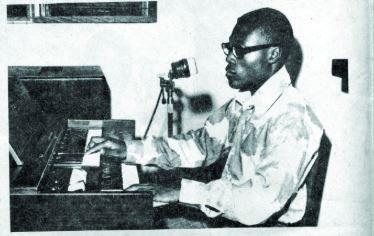
Segun Bucknor begins his career as the frontman of the new group, The Soul Assembly. Inspired by the emotional soul of Ray Charles and eager to fill the chasm left by the highlife and Afro-funk musicians chased out of Lagos by the Civil War, and backed by a recording contract from the British record label Polydor, Bucknor arrives Lagos and introduces his new brand of music.
Bucknor’s music fails to reach critical mass because of its derivative sound and the growing influence of Fela Anikulapo-Kuti who at the time is beginning to pioneer his own brand of music called Afro-beat, which fuses contemporary sounds with highlife. Bucknor and Kuti develop a rivalry that persists all through the 60’s and is superseded today only by the feud between Wizkid and Davido.
Ginger Folorunsho Johnson shares a stage with the Rolling Stones in a British variety television event. Rivalled only by the Beatles in 1969, the Rolling Stones were musical royalty, able to demand the best time slots and sell millions of records, Folorunsho was best known for his attempts to document the underground Afro-rock scene dominated by African immigrants in London.
Johnson would leave for Lagos later that year and spend half a decade trying to decode the Lagos music scene, working on a film and releasing significant music in that time.
The Fractions are finally disbanded and forcefully conscripted into active service in the Biafran war. At the tail end of the war and severely lacking active duty soldiers, the Biafran government began to arrest and conscript individuals they had formerly designated as high value into its infantry.
Tony Amadi, former Fractions bandmate would escape and with the help of Roy Chicago, find his way back to Lagos just before the end of the war.
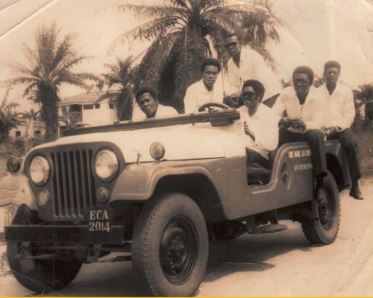
The Funkees play their last first official gig in the town of Nkwerre, even as the Nigerian Army closes around the town. The concert which lasts all night amidst sounds of shelling and deaths is a final act of defiance against the brutish power of the Nigerian Army and a final celebration of the ideals of the Biafra sovereign state.
One of the few Afro-funk bands that were formed in Eastern Nigeria during the war, the Funkees never had a classic line up of artists, with education, war and personal interest ensuring instrumentalists and vocalists were always joining and leaving the group. A few days after the war officially ends and the band mates of the Hykkers are taken into custody before being released to return to Lagos.
Ofo and the Black Company debut at the Afrika Shrine. This was the first Nigerian band to shirk the uniformity of traditional music bands at the time, basing the performances on the mysticism of the ‘Ofo’ cult from Eastern Nigeria, rather than choreography and performative cuteness as was customary at the time. Fela Anikulapo-Kuti was also experiencing a spiritual awakening at the time and had opened the Shrine to performers from across the country to come experiment.
Their music would form the basis for Nigerian performance artists like Twin Seven Seven, Quddus Onikeku and Bantu to incorporate contemporary performances into their sound.
American drummer and guitarist, Ginger Baker, formerly of the group Cream would undergo a cross-continental trek to reach Nigeria. His fascination with Nigeria would lead to an informal residency characterised by performance rehearsals and session with the emerging Afro-rock musicians of the era like Jake Sollo, Ify Jerry.
Baker’s jam sessions helped introduce and connect many of the afro-rock artists would go on to create bands together or start bitter rivalries.
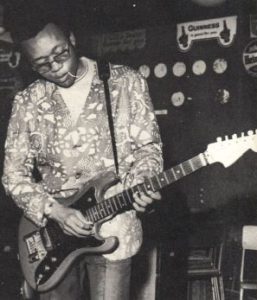
The Fractions disintegrate, from pressure from the Nigerian Army, ending the biggest feud of the Afro-funk era. Ify Jerry and Jake Sollo leave the Fractions to join the Hykkers who had risen victorious from the years of the war and were keen to return to Lagos and restart their careers.
Fela Anikulapo-Kuti then with his newly renamed Afrika 70 band would provide instruments and leverage for the group to make their comeback, complete with new performance material.
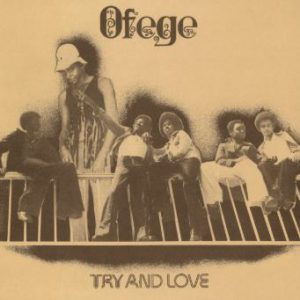
Ofege releases Try and Love, their debut album. Heavily influenced by American blues and R&B and Fela Anikulapo-Kuti, the young group’s music becomes one of the first albums to gain mainstream acceptance primarily through radio airplay. Defined by its insistence on centring the issues of young Nigerians and distinguished by the relative youth of its bandmates, Ofege would start a revolution of young Nigerians either starting or joining bands to try their hands at earning fame and fortune via music.
Blo, the Nigerian Afro-rock band formed by former band members of the group Salt, Laolu Akins and Mike Odumosu release their debut collaborative project ‘Chapter One’. Riding on the success of the album’s debut singles and the new interest in Nigeria by Western niche musical audiences, the album Chapter One would become an international success and separate Afro-rock from Afrofunk.
It would also give the band the leverage they needed to tour and perform in Warri, Lagos and Enugu.
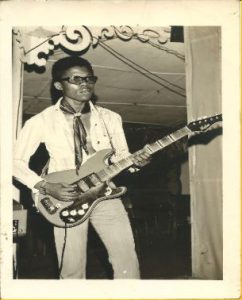
After being rough-handled by Nigerian soldiers during the war and forced to stay in Easter Nigeria as a symbol of the relative peace and unity the end of the War was supposed to bring, the Funkees leave Nigeria for England. But not before they convince, Jake Sollo, formerly of the Fractions and then the Hykkers to come play lead for their band.
A four-month travel gig would eventually extend into a four-year sojourn in England recording music and immersing themselves in the British Funk scene.
After three years of false starts, the Nigerian government finally hosts the Festac 77 global arts event. More than 15000 artists and creators from 55 countries attend the event and while the general atmosphere is progressive, a feud between the Nigerian government and Fela Anikulapo-Kuti leads to a ‘Counter Festac’ at the New Afrika Shrine, where dignitaries and performers sneak off to perform or hang out at the Shrine.
The Funkees return from their four-year sojourn in the UK to perform at Festac ‘77, and they also perform at the ‘Counter Festac’ signalling their shortlived return to music in the country.
Williams Onyeabor releases Crashes In Love, his debut album rumoured to be the soundtrack for an independent film he made of the same name. Crashes in love would introduce Onyeabor’s futuristic sound to the global house music scene, decades before the scene would gain mass appeal and crown Onyeabor as a cult-figure within the progressive dance and house music scenes.
Onyeabor would disappear from the scene after a few years and a handful of projects, signalling the official end of the Afro-funk movement.
[mc4wp_form id=”26074″]

